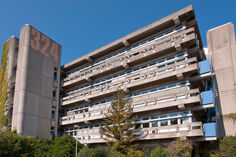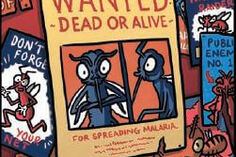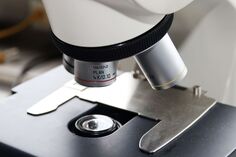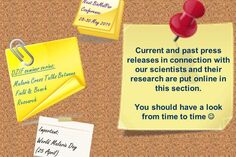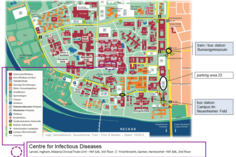
I had the opportunity to spend two months of my final year in med school in Wad Medani, Sudan. Here, I worked as a clinical elective in the infectious disease department of the University of Gezira Hospital and was able to broaden my horizon and gain new experiences in clinical diagnostics and treatment.

Wad Medani
Wad Medani is the capital and largest city of the Gezira state. It is located on the bank of the Blue Nile river and surrounded by rich agricultural farm lands watered by canals, which are popular swimming places. Here, you can find potato, peanuts and sugar cane fields. The city is exposed to a wide range of infectious diseases. I arrived in March, whene the temperatures are rising again but the rainy season has not yet started. At this time of the year, malaria infections are once again becoming more prevalent.
The hospital
I spent most of my time at the infectious disease ward of the University of Gezira Hospital. It is located next to the pediatric clinic since both have joint patients. The hospital is the biggest clinic in the area and that is why a lot of the patients come from villages outside of Medani to seek medical help.
The lead consultant is a member of the national malaria council and taught me a lot about the clinical treatment of malaria and the Sudanese health care system. The infectious diseases doctors also treat patients in other departments, especially in gynecology. In the outpatient department I was able to assess patients who were coming to get their intravenous malaria medication. The wards are big rooms with approximately 8 beds for inpatients. There are separate rooms for different kinds of patients: one room for malaria patients, one for septic patients and so on. The clinic also has some isolation rooms and private rooms which are more expensive and thus only occupied by wealthier patients.
Every morning, we had a ward round with the clinical lead, assistant doctors and students and every Wednesday a seminar to discuss difficult case reports. Everything was held in English but for the assessment of patients it was better to speak some Arabic.


The diseases
In Wad Medani, different vaccination centers are available to receive free vaccination and the overall population is well vaccinated. During my time there was one case of tetanus. Despite that, there were infectious diseases that you also find in Germany: septic patients, local infections or urinary tract infections. However, there were also cases of schistosomiasis from people swimming in the surrounding canals, typhus and of course many patients with malaria.
For me, the most impressing experience was to see young patients who were comatose because of cerebral malaria. Doing research on malaria parasites in the Frischknecht Lab, so far away from affected areas, it is difficult to comprehend how such a small organism can have such a big impact on patients, family members and the health care system.

The Blue Nile Institute
One day I had the opportunity to visit the Blue Nile Institute. I had contact with a student from the Wad Medani College of Medical Sciences and Technology, who was showing me around the city and who had friends at the institute. The institute does research on diagnostics and reviews patients as well. They also provided PCR tests and vaccines during the pandemic. While I was there, they taught me the difference between Plasmodium falciparum and Plasmodium vivax by showing me blood smears of local patients. They had a big collection of rural insects, spiders, scorpions, snakes and reptiles.
Moreover, the institute does research on vector control and I was able to see their insectary. It was quite similar to the insectary in the Parasitology Department in Heidelberg but showed minor differences. For example, they use fish food instead of cat food to feed the larvae (like does the Ingham lab). Furthermore, they used rabbits for blood meals in Aedes and Culix but a metal plate with parafilm for the Anopheles mosquitoes. In another room they breed snails that occur in the canals and fish which feed on mosquito eggs.




Ramadan
During the time I was visiting Ramadan started. It is a special month of strengthening one’s relationship with Allah and therefore the life in the city slowed down. People started fasting from sun rise till dawn and spent time in the mosque. In the morning before sunrise people were walking through the streets with drums to wake up everybody so that they can eat and drink before the fast starts. At dawn you were usually invited to eat with other families but if you were too late people on the street blocked the way and invited you to join them. A busy crossroad would turn into a meal place for that period of time. Ramadan ended with Eid and a morning prayer. Everybody was dressed nicely because of the celebration.

During the same time a civil war started between the Sudanese armed forces (SAF) and the rapid support forces (RSF). The war mainly took place in the capital Khartoum, in the west of Sudan, and at the northern military basis. Fortunately, I was safe in the Gezira region and life carried on here but with fear that the war might spread to the region. Soon, foreign countries started evacuation programs for their citizens but mainly from a place in the capital. It would have been too dangerous for me to join those programs as I was safe in Gezira. So I stayed there.
Since the airport in the capital was destroyed I had to take a bus to Port Sudan to leave the country. During the bus ride I got to see parts of Sudan that I had not yet seen: the mountains in Kassala or the red sea.
It was an impressing experience that I had and although I was sad to leave Sudan I had to depart to reach my next destination.



Currently I am in London for another elective in the infectious department of the University College London Hospital. It is one of the most specialized infectious diseases clinics, partnering with the London School of Hygiene and Tropical Medicine. I was already able to see interesting cases of tuberculosis, HIV and leprosy. Naturally, London is a big contrast to Medani but I appreciate both places.
